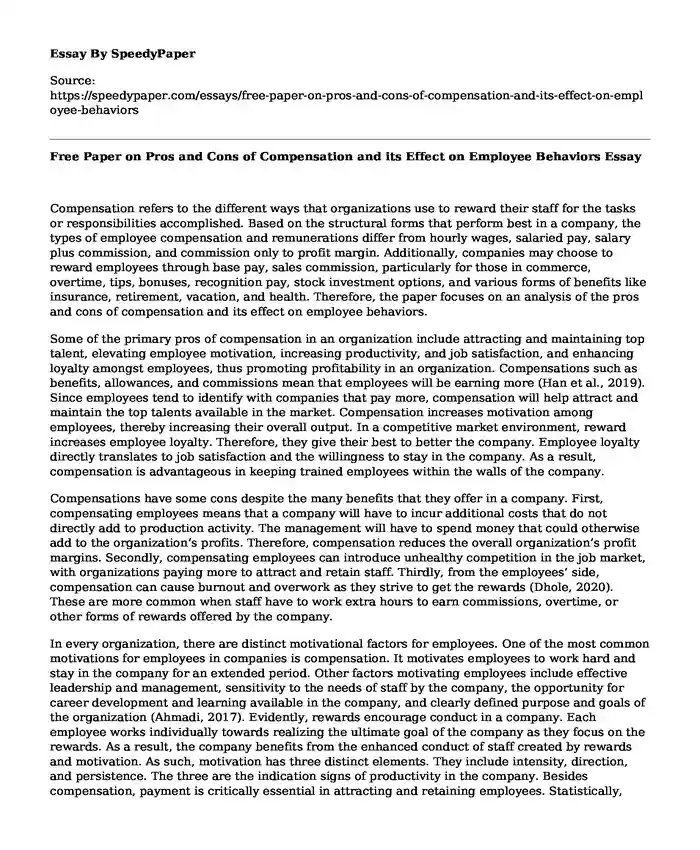
| Type of paper: | Essay |
| Categories: | Employment Organizational behavior Behavior |
| Pages: | 3 |
| Wordcount: | 749 words |
Compensation refers to the different ways that organizations use to reward their staff for the tasks or responsibilities accomplished. Based on the structural forms that perform best in a company, the types of employee compensation and remunerations differ from hourly wages, salaried pay, salary plus commission, and commission only to profit margin. Additionally, companies may choose to reward employees through base pay, sales commission, particularly for those in commerce, overtime, tips, bonuses, recognition pay, stock investment options, and various forms of benefits like insurance, retirement, vacation, and health. Therefore, the paper focuses on an analysis of the pros and cons of compensation and its effect on employee behaviors.
Some of the primary pros of compensation in an organization include attracting and maintaining top talent, elevating employee motivation, increasing productivity, and job satisfaction, and enhancing loyalty amongst employees, thus promoting profitability in an organization. Compensations such as benefits, allowances, and commissions mean that employees will be earning more (Han et al., 2019). Since employees tend to identify with companies that pay more, compensation will help attract and maintain the top talents available in the market. Compensation increases motivation among employees, thereby increasing their overall output. In a competitive market environment, reward increases employee loyalty. Therefore, they give their best to better the company. Employee loyalty directly translates to job satisfaction and the willingness to stay in the company. As a result, compensation is advantageous in keeping trained employees within the walls of the company.
Compensations have some cons despite the many benefits that they offer in a company. First, compensating employees means that a company will have to incur additional costs that do not directly add to production activity. The management will have to spend money that could otherwise add to the organization’s profits. Therefore, compensation reduces the overall organization’s profit margins. Secondly, compensating employees can introduce unhealthy competition in the job market, with organizations paying more to attract and retain staff. Thirdly, from the employees’ side, compensation can cause burnout and overwork as they strive to get the rewards (Dhole, 2020). These are more common when staff have to work extra hours to earn commissions, overtime, or other forms of rewards offered by the company.
In every organization, there are distinct motivational factors for employees. One of the most common motivations for employees in companies is compensation. It motivates employees to work hard and stay in the company for an extended period. Other factors motivating employees include effective leadership and management, sensitivity to the needs of staff by the company, the opportunity for career development and learning available in the company, and clearly defined purpose and goals of the organization (Ahmadi, 2017). Evidently, rewards encourage conduct in a company. Each employee works individually towards realizing the ultimate goal of the company as they focus on the rewards. As a result, the company benefits from the enhanced conduct of staff created by rewards and motivation. As such, motivation has three distinct elements. They include intensity, direction, and persistence. The three are the indication signs of productivity in the company. Besides compensation, payment is critically essential in attracting and retaining employees. Statistically, more than 70% of employees are always looking for better pay worldwide (Darma & Supriyanto, 2017). Therefore, companies that pay better are more likely to attract and retain nomadic employees. Some of the actions that compensation reinforces in an organization include hard work, resilience, teamwork, employee loyalty, and cooperation, among others (Darma & Supriyanto, 2017).
Conclusion
Conclusively, compensation is a vital employee motivation factor. Advantages of compensation in a company include enhancing loyalty amongst employees, increasing productivity, attracting and maintaining top-notch staff, and building the reputation of a company. However, compensation can be disadvantageous to an organization as it reduces the profit margins. It can also affect employees negatively by causing burnout and overwork. Poorly compensated employees can also be a negative force in the company. Different companies use different factors to motivate employees, among them being compensation, well-defined purpose and goals, the opportunity for career development, and increased opportunity for individual development.
References
Ahmadi, M. R. (2017). The impact of motivation on reading comprehension. International Journal of Research in English Education, 2(1), 1-7. http://ijreeonline.com/files/site1/user_files_68bcd6/admin-A-10-1-9-13b10a6.pdf
Darma, P. S., & Supriyanto, A. S. (2017). The effect of compensation on satisfaction and employee performance. Management and Economics Journal (MEC-J), 1(1). https://www.researchgate.net/profile/Achmad_Supriyanto/publication/322247668_THE_EFFECT_OF_COMPENSATION_ON_SATISFACTION_AND_EMPLOYEES_PERFORMANCE/links/5a742c6d0f7e9b20d490a7fd/THE-EFFECT-OF-COMPENSATION-ON-SATISFACTION-AND-EMPLOYEES-PERFORMANCE.pdf
Dhole, V. (2020). Compensation Management. http://studymaterial.unipune.ac.in:8080/jspui/bitstream/123456789/3867/1/Compensation_Management_UOP.pdf
Han, Z., Wang, Q., & Yan, X. (2019). How responsible leadership motivates employees to engage in organizational citizenship behavior for the environment: A double-mediation model: Sustainability, 11(3), 605. https://www.mdpi.com/2071-1050/11/3/605/pdf
Cite this page
Free Paper on Pros and Cons of Compensation and its Effect on Employee Behaviors. (2023, Dec 10). Retrieved from https://speedypaper.net/essays/free-paper-on-pros-and-cons-of-compensation-and-its-effect-on-employee-behaviors
Request Removal
If you are the original author of this essay and no longer wish to have it published on the SpeedyPaper website, please click below to request its removal:
- Why We Need to Say Goodbye to Work - Free Essay with the Article Analysis
- Presentation Example: Random Acts of Kindness
- Essay Example on How to Market Yourself on the Job Market
- Essay Sample on Building Virtual Teams
- Paper Example. Agile-Lean Frameworks
- Essay Sample on Health Care Reform Interview
- Essay Example - Globalization Shaping Political Identity
Popular categories




